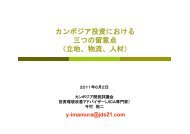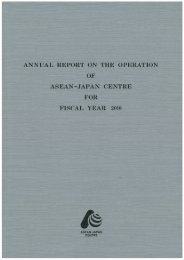2 Alcoholic Beverages (Beer, Wine, Whisky, etc.) - ASEAN-Japan ...
2 Alcoholic Beverages (Beer, Wine, Whisky, etc.) - ASEAN-Japan ...
2 Alcoholic Beverages (Beer, Wine, Whisky, etc.) - ASEAN-Japan ...
You also want an ePaper? Increase the reach of your titles
YUMPU automatically turns print PDFs into web optimized ePapers that Google loves.
C-2. <strong>Alcoholic</strong> <strong>Beverages</strong> (<strong>Beer</strong>, wine, whisky, <strong>etc</strong>.)<br />
procedures employed, in as much as consumers may not understand such label information on the original<br />
winery label.<br />
[<strong>Beer</strong>]<br />
<br />
Under the Code, importers are required to display a list of ingredients, country of origin, method of<br />
preserving, caution of handling, <strong>etc</strong>. Importers must label the list of ingredients, except water, in the order of<br />
and under the names that stipulated by the Liquor Tax Law.<br />
Contact: <strong>Japan</strong> <strong>Wine</strong>s and Spirits Importers Association TEL: 03-3503-6505<br />
<br />
Use of any of the following terms on the product label signifies that the beer satisfies certain established<br />
criteria. These criteria must be met before the terms can be used, but their usage is optional. The label may<br />
contain any or all of these terms for which the product meets the defined criteria.<br />
① Lager beer: <strong>Beer</strong> aged during storage<br />
② Draft beer: Unpasteurized beer<br />
③ Black beer: Dark-colored beer made partly from dark-colored barley<br />
④ Stout beer: Dark-colored, strong-tasting beer made partly from dark-colored barley<br />
<br />
<strong>Beer</strong> makers that belong to the Brewers Association of <strong>Japan</strong> began voluntarily including in labeling a<br />
statement that drinking during pregnancy or while nursing may adversely impact the growth and development<br />
of the fetus or infant. This practice started with beer manufactured in June 2004. Consideration is being given<br />
to extending the practice to happoshu, chuhai and other liquors as well.<br />
[<strong>Whisky</strong>]<br />
<br />
Under the Code, importers are required to display a list of ingredients and country of origin.<br />
Contact: <strong>Japan</strong> <strong>Wine</strong>s and Spirits Importers Association TEL: 03-3503-6505<br />
(4) Key Considerations for entering the <strong>Japan</strong>ese Market<br />
Before entering the <strong>Japan</strong>ese liquor market, prospective importers must first make sure that all necessary<br />
business licenses for sale of liquors under the Liquor Tax Laws have been obtained. In the case of alcoholic<br />
beverages, coloring agents and preservatives are sometimes used as additives. Products containing additives<br />
that are not approved for use with food products under <strong>Japan</strong>ese standards, or in excess of permissible<br />
quantities may not be imported into <strong>Japan</strong>. When the alcoholic beverage is being imported into <strong>Japan</strong> for the<br />
first time, voluntary inspection performed in advance by official laboratories registered with the Minister of<br />
Health, Labor and Welfare in <strong>Japan</strong> or registered official laboratories in the exporting country may be essential.<br />
<strong>Alcoholic</strong> beverages must contain less than 1mg/cubic cm of methanol. Prospective importers should obtain<br />
samples and check thoroughly in advance to determine whether the product conforms to <strong>Japan</strong>ese standards.<br />
[<strong>Wine</strong>]<br />
Importing and selling wines require some knowledge of the characteristics of the product. In particular, the<br />
delicate flavor of wine requires that it be stored and transported under precisely controlled temperature<br />
conditions. Ships from Europe and Australia must pass through tropical regions where the temperature rises<br />
as high as 40 degrees Celsius. Because of this, many exporters ship wine in reefer containers that keep the<br />
wine at a set temperature. In addition, while in storage wine should be kept in a wine cellar or an equivalent<br />
facility where the temperature can be maintained at 15-20 degrees Celsius.<br />
[<strong>Beer</strong>]<br />
Prospective beer importers should also bear in mind the following points:<br />
• Study carefully the <strong>Japan</strong>ese taste preferences, then establish a distinctive identity and appeal that sets<br />
them apart from domestic beers. Unsold stocks will deteriorate, resulting in flat beer, broken bottles and<br />
crusted cans. Defective will have to be discarded, which is costly in it. Also, customs duties and liquor<br />
taxes are not refundable. For these reasons, prospective importers would be well advised to begin by<br />
importing and test marketing only a small quantity of beer in <strong>Japan</strong>.<br />
• Must have a thorough understanding of beer distribution and retailing practices in <strong>Japan</strong>.<br />
Marketing Guide for <strong>ASEAN</strong> Exporters to <strong>Japan</strong><br />
204




